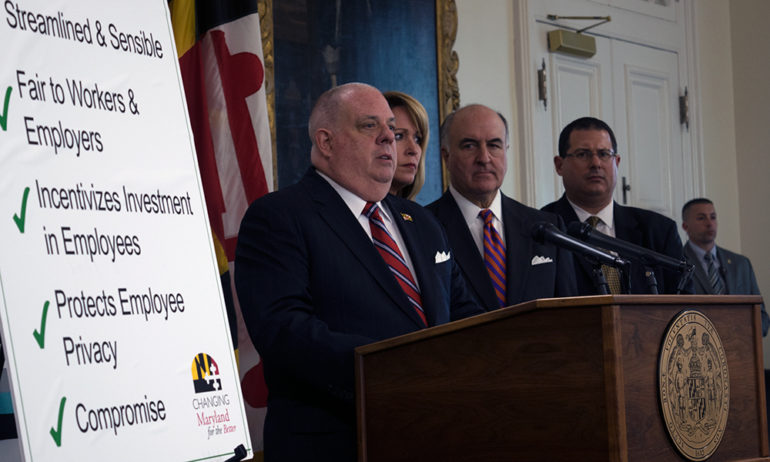ANNAPOLIS, Maryland — Maryland Gov. Larry Hogan unveiled measures Tuesday requiring companies with 25 or more employees to grant paid leave by 2020, and funding a $100 million tax credit over five years to “offset the costs of small businesses supplying these benefits.”
The emergency legislation, which Hogan said will be introduced Jan. 10, offers a middle ground between the governor’s previous bill, which was torpedoed in the Maryland Senate, and the “Healthy Working Families Act,” proposed and passed last session by Democrats and vetoed by the Republican governor.
Sen. Thomas “Mac” Middleton, D-Charles County, who serves as chair of the Finance Committee said that he and other Democrats will push for a veto override in the upcoming legislative session.
“We’re beyond compromise,” Middleton said. “We need to move forward.”
Both parties have accused each other of partisan politics. Hogan, in his press conference Tuesday, said that certain members of the legislature took it upon themselves to “ram through — on a party line vote — a terrible bill.”
“They chose to play politics rather than provide a real solution we can all get behind,” Hogan said, adding that the Democrat’s bill would “crush” small businesses and “kill” jobs.
The new bill, Hogan said, eliminates “burdensome red tape and intrusive provisions.”
Democrats took issue with Hogan calling his latest measure the “Paid Leave Compromise Act.”
“It’s not a compromise, because a compromise implies one party talked to the other side,” said Delegate Luke Clippinger, a Democrat who represents Baltimore City and who sponsored the legislation that the governor vetoed in May.
Clippinger’s bill required, among other things, that businesses with 15 or more employees provide “earned sick and safe leave that is paid at the same wage rate as the employee normally earns.”
“Quite frankly, his bringing forward an emergency bill is window dressing for Marylanders,” Clippinger said. “This has been an emergency situation for quite a long time.”
Hogan said he hopes Democrats will “come to the table” on his compromise proposal, but that doesn’t look likely.
“What it’s ultimately going to come down to is this,” Clippinger said. “We have the votes. We’re going to override the governor’s veto.”

